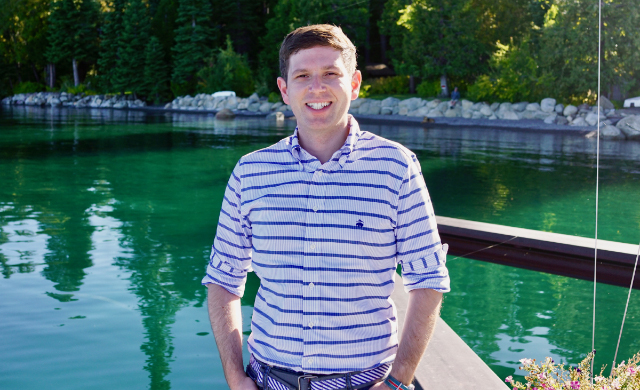A computational approach to human health
Though a visit to the doctor’s office can seem like it takes hours, physicians actually spend an average of only 13 minutes with each patient, according to an annual report compiled by WebMD.
Between those brief exams, periodic health status reports, and occasional lab tests, a physician receives only episodic snapshots of a patient’s current state, which makes it difficult to identify the early onset of disease. But big data and the power of computation could provide a better way, said Harvard John A. Paulson School of Engineering and Applied Sciences (SEAS) alumnus Dimitrios Antos, Ph.D. ’12.
“We are moving to a world where we have the information processing ability to analyze tons of data about a patient, such as their genetic profile, behavior, stress level, and more. At the same time, we have this amazing hardware we can use to track body behavior through sensors,” he said. “We can aggregate all of that, analyze it, and help detect disease earlier and understand how disease works in the real world.”
In a nutshell, that’s the goal of the Project Baseline study, a far-reaching initiative led by Verily, in partnership with Duke University School of Medicine, Stanford Medicine, and Google. Antos, who earned a Ph.D. in computer science at SEAS, serves as staff software engineer at Verily.

The project’s initial phase seeks to compile and analyze comprehensive health data on 10,000 patients, in an effort to understand human health and detect early disease markers. As software technical lead for Project Baseline, Antos’ role is to develop the technical infrastructure that enables that aggregation, creating systems that are scalable to handle vast amounts of information, while safeguarding patients’ privacy at every turn.
“Disease doesn’t happen in the real world the way it usually appears in a textbook,” he said. “There are social factors, emotional factors, and economic factors involved. Understanding those factors could help us diagnose and treat disease better.”
A desire to understand human behavior inspired Antos to pursue a Ph.D. at SEAS. Working with advisor Barbara Grosz, Higgins Professor of Natural Sciences, he developed computational models of human emotions, studying how emotions can inform the decision making process for both people and computers.
Antos’ thesis argued that emotions are actually part of human rationality, and they are one of the factors that make us so successful in the real world, even in the most complex situations.
“For me, humans are more interesting than computers, which usually act in very deterministic ways,” he said. “My research was very interesting in that you could take something like emotions, which is very accessible to people in an informal way, and try to really formalize it and understand it.”

After graduation, Antos began a software engineering career at Google, where he worked on a team in distributed systems that sought to enable more efficient file transfers. A desire to tackle multifaceted problems that directly impact human health led Antos to join the team at Google X Life Sciences, which was eventually spun out as Verily, under Google parent Alphabet.
He was attracted to the company’s focus on changing the way research and care are addressed, and was especially drawn to the multidisciplinary team of health care providers, hardware and software experts, scientists, and laboratory technicians working together to drive the project.
“What I realized is that, when you are sick, when you are suffering, when your loved ones are dealing with a medical condition, everything else fades into the background,” he said. “If we have really smart people here in Silicon Valley, we should pool those minds together behind a noble effort to help those people.”
As the lead software engineer, Antos works with a diverse group of individuals as he builds and refines the Project Baseline infrastructure. One of the biggest challenges is drawing cohesive information from isolated data silos utilized by a vast range of different health care providers and insurers.
In addition to the technical challenges of compiling scientifically valid data from so many sources, Antos must also walk a tightrope between a complex set of regulatory constraints.
His experience as a Ph.D. candidate at SEAS has helped him succeed. Antos developed patience and the ability to cope with setbacks, while also learning to be flexible about the direction of research. Those skills are especially useful in the fast-paced and uncertain world of life sciences research, he said.
While he remains passionate about research, Antos now looks forward to making a practical impact.
“In the end, through our work, we stand to make real good in the world,” he said.
Watch this introductory video about Project Baseline.
Video courtesy of Verily: https://youtu.be/ufOORB6ZNaA